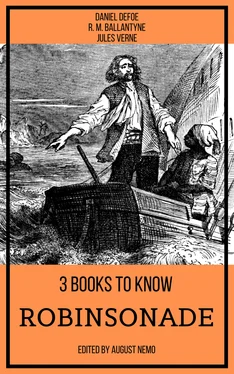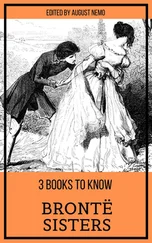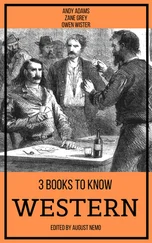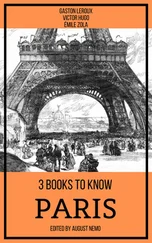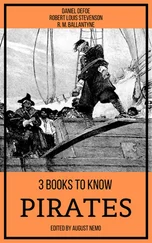At first, in the strength of our delight, we rowed hither and thither without aim or object. But after the effervescence of our spirits was abated, we began to look about us and to consider what we should do.
“I vote that we row to the reef,” cried Peterkin.
“And I vote that we visit the islands within the lagoon,” said I.
“And I vote we do both,” cried Jack; “so pull away, boys!”
As I have already said, we had made four oars; but our boat was so small that only two were necessary. The extra pair were reserved in case any accident should happen to the others. It was therefore only needful that two of us should row, while the third steered by means of an oar — and relieved the rowers occasionally.
First we landed on one of the small islands and ran all over it, but saw nothing worthy of particular notice. Then we landed on a larger island, on which were growing a few cocoa-nut trees. Not having eaten anything that morning, we gathered a few of the nuts and breakfasted. After this we pulled straight out to sea, and landed on the coral reef.
This was indeed a novel and interesting sight to us. We had now been so long on shore that we had almost forgotten the appearance of breakers, for there were none within the lagoon. But now, as we stood beside the foam-crested billow of the open sea, all the enthusiasm of the sailor was awakened in our breasts; and as we gazed on the widespread ruin of that single magnificent breaker that burst in thunder at our feet, we forgot the Coral Island behind us, we forgot our bower and the calm repose of the scented woods, we forgot all that had passed during the last few months, and remembered nothing but the storms, the calms, the fresh breezes, and the surging billows of the open sea.
This huge, ceaseless breaker, to which I have so often alluded, was a much larger and more sublime object than we had at all imagined it to be. It rose many yards above the level of the sea, and could be seen approaching at some distance from the reef. Slowly and majestically it came on, acquiring greater volume and velocity as it advanced, until it assumed the form of a clear watery arch, which sparkled in the bright sun. On it came with resistless and solemn majesty, the upper edge lipped gently over, and it fell with a roar that seemed as though the heart of Ocean were broken in the crash of tumultuous water, while the foam-clad coral reef appeared to tremble beneath the mighty shock!
We gazed long and wonderingly at this great sight, and it was with difficulty we could tear ourselves away from it. As I have once before mentioned, this wave broke in many places over the reef and scattered some of its spray into the lagoon; but in most places the reef was sufficiently broad and elevated to receive and check its entire force. In many places the coral rocks were covered with vegetation — the beginning, as it appeared to us, of future islands. Thus, on this reef, we came to perceive how most of the small islands of those seas are formed. On one part we saw the spray of the breaker washing over the rocks, and millions of little, active, busy creatures continuing the work of building up this living rampart. At another place, which was just a little too high for the waves to wash over it, the coral insects were all dead; for we found that they never did their work above water. They had faithfully completed the mighty work which their Creator had given them to do, and they were now all dead. Again, in other spots the ceaseless lashing of the sea had broken the dead coral in pieces, and cast it up in the form of sand. Here sea-birds had alighted, little pieces of seaweed and stray bits of wood had been washed up, seeds of plants had been carried by the wind, and a few lovely blades of bright green had already sprung up, which, when they died, would increase the size and fertility of these emeralds of Ocean. At other places these islets had grown apace, and were shaded by one or two cocoa-nut trees, which grew literally in the sand, and were constantly washed by the ocean spray — yet, as I have before remarked, their fruit was most refreshing and sweet to our taste.
Again, at this time Jack and I pondered the formation of the large coral islands. We could now understand how the low ones were formed; but the larger islands cost us much consideration, yet we could arrive at no certain conclusion on the subject.
Having satisfied our curiosity, and enjoyed ourselves during the whole day in our little boat, we returned, somewhat wearied, and withal rather hungry, to our bower.
“Now,” said Jack, “as our boat answers so well we will get a mast and sail made immediately.”
“So we will!” cried Peterkin as we all assisted to drag the boat above high-water mark. “We’ll light our candle and set about it this very night. Hurrah, my boys, pull away!”
As we dragged our boat, we observed that she grated heavily on her keel; and as the sands were in this place mingled with broken coral rocks, we saw portions of the wood being scraped off.
“Hallo!” cried Jack on seeing this, “that won’t do. Our keel will be worn off in no time at this rate.”
“So it will,” said I, pondering deeply as to how this might be prevented. But I am not of a mechanical turn naturally, so I could conceive no remedy save that of putting a plate of iron on the keel; but as we had no iron, I knew not what was to be done. “It seems to me, Jack,” I added, “that it is impossible to prevent the keel being worn off thus.”
“Impossible?” cried Peterkin. “My dear Ralph, you are mistaken; there is nothing so easy.”
“How?” I inquired in some surprise.
“Why, by not using the boat at all!” replied Peterkin.
“Hold your impudent tongue, Peterkin!” said Jack as he shouldered the oars. “Come along with me, and I’ll give you work to do. In the first place, you will go and collect coca-nut fibre, and set to work to make sewing-twine with it —”
“Please, captain,” interrupted Peterkin, “I’ve got lots of it made already — more than enough, as a little friend of mine used to be in the habit of saying every day after dinner.”
“Very well,” continued Jack; “then you’ll help Ralph to collect cocoa-nut cloth and cut it into shape, after which we’ll make a sail of it. I’ll see to getting the mast and the gearing; so let’s to work.”
And to work we went right busily, so that in three days from that time we had set up a mast and sail, with the necessary rigging, in our little boat. The sail was not, indeed, very handsome to look at, as it was formed of a number of oblong patches of cloth; but we had sewed it well by means of our sail-needle, so that it was strong, which was the chief point. — Jack had also overcome the difficulty about the keel by pinning to it a false keel. This was a piece of tough wood, of the same length and width as the real keel, and about five inches deep. He made it of this depth because the boat would be thereby rendered not only much more safe, but more able to beat against the wind — which, in a sea where the trade-winds blow so long and so steadily in one direction, was a matter of great importance. This piece of wood was pegged very firmly to the keel; and we now launched our boat with the satisfaction of knowing that when the false keel should be scraped off we could easily put on another — whereas, should the real keel have been scraped away, we could not have renewed it without taking our boat to pieces, which Peterkin said made his “marrow quake to think upon.”
The mast and sail answered excellently; and we now sailed about in the lagoon with great delight, and examined with much interest the appearance of our island from a distance. Also, we gazed into the depths of the water, and watched for hours the gambols of the curious and bright-coloured fish among the corals and seaweed. Peterkin also made a fishing-line; and Jack constructed a number of hooks, some of which were very good, others remarkably bad. Some of these hooks were made of iron-wood — which did pretty well, the wood being extremely hard — and Jack made them very thick and large. Fish there are not particular. Some of the crooked bones in fish-heads also answered for this purpose pretty well. But that which formed our best and most serviceable hook was the brass finger-ring belonging to Jack. It gave him not a little trouble to manufacture it. First he cut it with the axe, then twisted it into the form of a hook. The barb took him several hours to cut. He did it by means of constant sawing with the broken penknife. As for the point, an hour’s rubbing on a piece of sandstone made an excellent one.
Читать дальше
